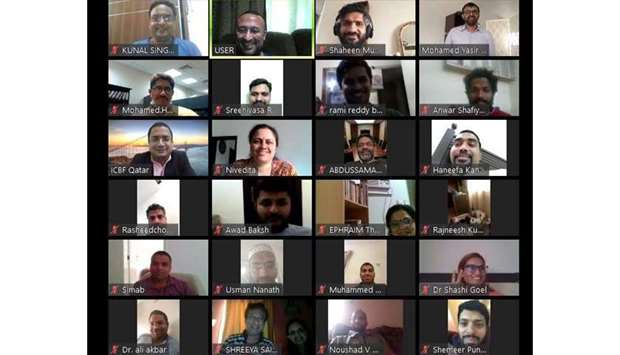Life poses challenges and problems for many people. As long as we are alive, we will continue to face a new challenge everyday. While it may not be possible to resolve all of our problems, it is important to learn to handle our problems.
The Indian Community Benevolent Forum (ICBF) continues to support the community by arranging regular sessions on how to face a challenge with positivity during the coronavirus pandemic. The recently held session on the topic of Finding Inner Strength to Gain Resilience was addressed by Mohamed Yasir Thayyil Kizhakkehtil, Doha-based Indian psychotherapist.
Yasir, who has a long career in the field of psychotherapy and counselling, in his detailed session briefed the participants on how they can tackle the uncertain and tense times triggered by the Covid-19 lockdown and economic fallout.
“Many changes have taken place due to the pandemic. We are no longer meeting people. Our work style has also been changed. There is a marked change in our priorities with more focus on our basic needs. Time for families has increased. There is considerable drop in expenses as people do not go out much. Food habits are changed as well. People have more time for online entertainment. Finally, there is less pollution. We have more conscious about our health,” said Yasir staring his talk about the changes made by the virus outbreak.
The expert explained the stages an individual goes through when he or she faces a problem or change. “Usually, people go through a series of stages starting from denial and ending into acceptance. The first reaction of human to change is that of rejection and denial. As the change or problem brings along many unforeseen issues, people often become angry and uneasy. There can be a blame game within families or accusations against the government. When the things are not in control, people often start going into depression.
“As we realise that we have to live and move on, people start bargaining with the situation. They try to find reason behind the change or problem. They start discussing it with other people. At this stage, they slowly but surely start moving towards acceptance. They finally accept the situation or problem.
“The underline effort of this session is how we can help people quickly travel from the stage of denial to that of acceptance. Early we used to say survival of the fittest but now we say survival of the quickest.”
The psychotherapist further shared that after the acceptance of the change, people start responding to the new reality in various modes. “Some people become very passive. Others will become more as spectators as they will get addicted to the news related to the change. Some people start playing as victims making excuses and blaming others. Others will become cheerleaders telling themselves it is going to be fine. There however are some people who become very active and take persistent and massive action.”
The facilitator sees resilience as a reservoir of strength. “We need ingredients in the reservoir to extract whenever we need. The ingredients are inner energy, resources to connect, resources from connect, and spiritual base. The inner strength comes from our convictions and the purpose of our struggle. Adaptation is the key in finding the inner strength. We have to honest with ourselves to find the inner strength. We also need to discipline ourselves according to the new realities. We have to sort out what is important and what is not. We also need to develop consensus in the family before making a decision by bringing everyone on same page. Now is the time for us to live more consciously.”
For Yasir refinement of the self towards resilience is very important. “To refine ourselves, we need to have commitment for the purpose. Good intentions and clarity of purpose are necessary to have self-refinement. We also have to be true to ourselves and to others. The process can be difficult in the beginning.”
The facilitator stresses the point that the pandemic lockdown does not mean that the human energy is also locked. “We can still have positive energy by doing different kinds of work that produce healthy hormones. The activities such as exercise, helping others, personal accomplishments, and expression of love and intimacy help creative positive hormones.
“Everything in our life cannot be controlled. We should be worrying about what is in our hand and what is not. Once we develop resilience, we will be able to give meaning to our lives. We will be able to make it beautiful for us and for those around us.”

IN SESSION: The recent session by ICBF was held on the topic ‘Finding Inner Strength to Gain Resilience’.
